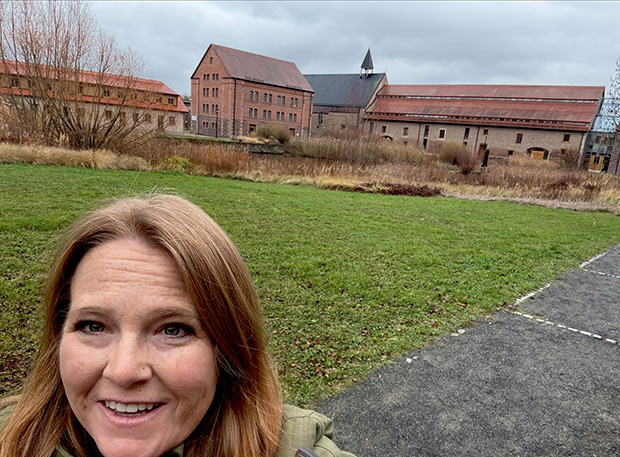
Ella Johnson takes a selfie in front of Helfta monastery in Eisleben, Saxony-Anhalt, Germany.
By Ella Johnson
SAU Theological Perspective
When I arrived in the Helfta monastery in the small city of Eisleben in Saxony-Anhalt Germany on a cold day in December, after two days of travel, I instantly burst into tears. I had been dreaming of visiting this place, where the 13th-century mystic Gertrude the Great lived and wrote, ever since I began studying her in my PhD program, over 18 years ago.
I immediately recognized the fishpond about which she wrote. It felt surreal to be in the place in which she sat more than 700 years ago carving words into a wax tablet that she strapped and draped over her monastic habit. I had retyped these same words on the laptop in my backpack that slung over my winter coat:
“I … was sitting besides the pleasantness of the place. The crystalline water flowing through, the fresh green trees standing around, the freedom of the birds, especially the doves, wheeling in flight, all gave me pleasure…. I trust, my God that it was you — you who produced pleasures beyond price…” (“The Herald of God’s Loving-Kindness,” 105). I could have stood in that spot for days and stayed at the monastery for months. However, I only had time to visit for a couple days.
I can’t seem to get enough of this medieval Cistercian nun! What is it about her? First, the way in which she regards the pleasure of physical sensation as prayer. Rather than regarding the body and its senses as obstacles to holiness, she sees them as gateways. In a blessing over each of the sensory organs she declares: “Blessed the eyes that see you, O God, love, …. Blessed are the ears that hear you, O God, love, Word of life . . . Blessed the nose that breathes you, O God, love, life’s most dulcet aroma … Blessed the mouth that tastes, O God, love, the words of your consolation, sweeter than honey and the honeycomb …. Blessed the soul that clings inseparably to you in an embrace of love” (“Spiritual Exercises,” 90–91).
For Gertrude, the senses perceive the glory of God’s handiwork in creation and in the ways in which God is present in the liturgy. After receiving the Eucharist at Mass on one occasion, she cried out to God: “O eternal solstice, safe dwelling, place containing all pleasure, heavenly garden of everlasting delights flowing with streams of pleasures beyond price, coaxing forth the blossoming spring-time of all kinds of loveliness, soothing sweet sound… bringing refreshment with the perfumed breath of life-giving scents, intoxicating with the melting sweetness of inner savors, bringing transformation with the wonderful caresses of intimate embraces!…. What sights, what sounds, what scents, what delicious savors, what sensations! (“The Herald of God’s Loving-Kindness,” 123).
I am also inspired by Gertrude becoming a theologian during a time when women were not allowed to be theologians.
Her sisters say that she worked quickly, with pleasure, and that she “tirelessly ruminated on the books of the Bible which she could obtain. The basket of her heart she packed to the very top with the more useful, and honey-sweet, texts of holy Scripture, so that she always had at hand an instructive and holy quotation. Hence she could give a ready answer to anyone who came before her, and turn aside any kind of error with scriptural witnesses so appropriate that almost no one could refute her” (“The Herald of God’s Loving-Kindness,” 39).
Gertrude was both a theological scholar and a teacher: “Elucidating and clarifying what lesser minds found obscure, she made compilations from the sayings of the saints, gathered as a dove gathers grain, and committed to writing many books filled with all sweetness, for the general profit of all those who wished to read them” (“The Herald of God’s Loving-Kindness,” 39).
“For the same reason, if she found anything useful in holy Scripture which seemed hard for the less intelligent to understand, she would alter the Latin and rewrite it in a more straightforward style, so that it would be more useful to those who read it. She spent her whole life in this way, from early morning until night, sometimes in summarizing lengthy passages, sometimes in commenting on difficulties in her desire to promote God’s praise and her neighbor’s salvation” (“The Herald of God’s Loving-Kindness,” 57-58).
Gertrude is one of my most cherished foremothers. Gertrude has taught me to sense God’s presence more deeply in creation, in the liturgy, and in my theological vocation to teach and write for the service of the Church and others. I am beyond grateful for her witness and for finally being able to visit her home!
(Ella Johnson has published her research on Gertrude in her book: “This is My Body: Eucharistic Theology and Anthropology in the Writings of Gertrude the Great of Helfta,” Collegeville: Liturgical Press, 2020. She is currently working on a second book on Gertrude’s Spiritual Exercises.)








